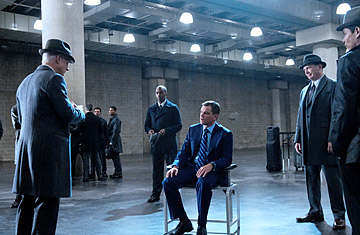
From Left: John Slattery, Anthony Mackie, Matt Damon and Andrew Schwartz in The Adjustment Bureau.
(2 of 2)
No utopian, Dick saw Ed's inadvertent intervention in the grand scheme as an accidental crime that would have to be punished. But Nolfi, making his directorial debut after working on scripts for the Damon movies Oceans Twelve and The Bourne Ultimatum, goes the dewy-eyed romantic route here. By reimagining the supernatural bureaucracy as a legion to be not surrendered to but outsmarted and outrun, he plays to the strength of Damon, whose franchise character is Jason "One-Man-Against-the-System" Bourne, and whose signature post-Bourne persona is the mild-mannered obsessive, pursuing his own angels and demons — in Green Zone, The Informant!, Hereafter and here. In The Adjustment Bureau David shouts the battle cry of Damon heroes: "I don't care what you put in my way, I'm not giving up!"
The Adjustment Bureau is one of those movies — like The Matrix and Inception, but not in their league — that has to keep explaining its complicated and shifting rules. ("Turn the knob this way to enter another realm" — "They have trouble finding you when it rains.") That's fine for the advanced levels of video games, not so much for film narratives that at their climax should tighten rather than expand. In its final chase scene, The Adjustment Bureau gets a severe attack of travelogorrhea, as David and Elise show up at the Museum of Modern Art and, in an eye-blink, at Yankee Stadium. (On the plus side, New York City looks great, as if all of the Bureau's minions had been sprucing it up for months. The restaurants, cobblestones and sewers of downtown Manhattan were never so enticing. And I say that not simply because one rainy chase scene was shot in the alley behind my apartment building.)
Nolfi also gets a tad woozy with the cosmology he's invented. The Bureau must employ more monitors than Walmart, since, to judge from David's case, each human has a dozen or so minders. They've also had great lapses of capriciousness over the span of human history. We learn that the angels stepped back and let mankind rule its own destiny for only two periods: the millennium between the fall of the Roman Empire and the Italian Renaissance — that was an awfully long vacation, guys — and for the 50 years between the hatching of World War I and the Cuban Missile Crisis. But that half-century also produced the golden age of Hollywood movies and the Great American Song Book, so I'd say it's pretty much a wash. The adjustors have been our guardians since the mid-'60s; but, really, has the progress of world events been so very splendid? Didn't the Bureau take its eye off Africa and the Mideast? Or was it simply consumed with micromanaging David's fate that it didn't notice the genocide and terrorists?
None of this will matter if you buy the romance at the movie's core. I didn't. Damon is fine — righteous, sweet but not soft, a true liberal hero — but he has greater rapport, however edgy, with his angel adversaries (Slattery, Anthony Mackie and Terence Stamp). Blunt, the beautiful English creature from My Summer of Love, Dan in Real Life and The Young Victoria, wears frocks that make her shoulders look of linebacker dimensions; and thought she does flirting really well, her Emily didn't convince me she was David's indelible soulmate.
Of course David and Emily, and the angels too, are at the mercy of their own adjustor, Nolfi. Like the string-pullers who, the movie says, determine our destinies, he runs theirs. And like the angels, he sometimes makes mistakes. A good premise wasted, this film needed another big brain to save it from its third-act excesses. Could somebody appeal to the Screenwriters Bureau?
